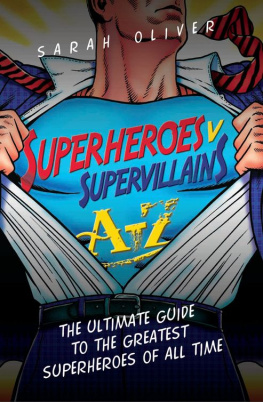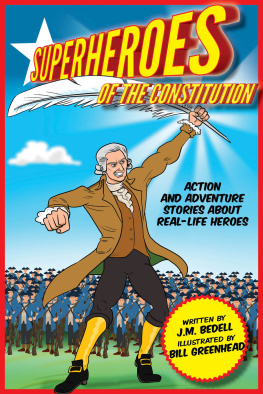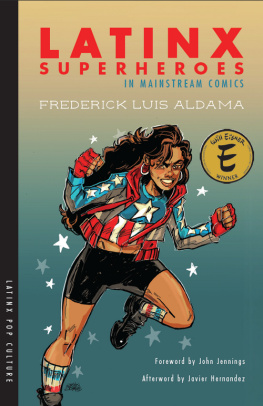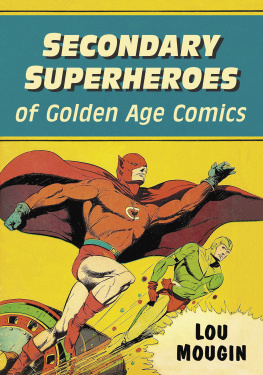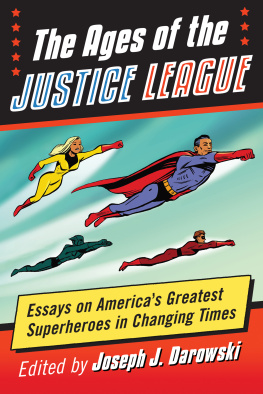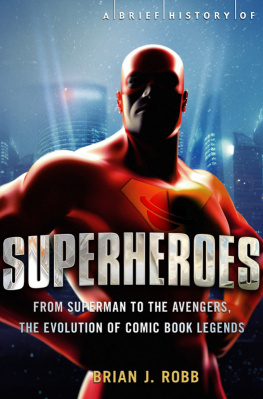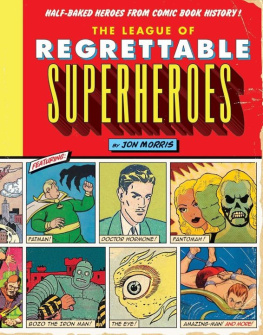ON THE ORIGIN OF SUPERHEROES
ON THE ORIGIN OF SUPERHEROES
FROM THE BIG BANG TO ACTION COMICS NO. 1
CHRIS GAVALER
UNIVERSITY OF IOWA PRESS
IOWA CITY
University of Iowa Press, Iowa City 52242
Copyright 2015 by the University of Iowa Press
www.uiowapress.org
Printed in the United States of America
Design by April Leidig
No part of this book may be reproduced or used in any form or by any means without permission in writing from the publisher. All reasonable steps have been taken to contact copyright holders of material used in this book. The publisher would be pleased to make suitable arrangements with any whom it has not been possible to reach.
The University of Iowa Press is a member of Green Press Initiative and is committed to preserving natural resources.
Library of Congress Cataloging-in-Publication Data
Gavaler, Chris.
On the origin of superheroes : from the big bang to Action Comics no. 1 / Chris Gavaler.
pages cm
Includes bibliographical references and index.
ISBN 978-1-60938-381-7 (pbk)
ISBN 978-1-60938-382-4 (ebk)
1. Heroes in literature. 2. Superheroes in literature. 3. Heroic virtue. 4. HeroesHistory. 5. HeroesMythology. I. Title.
PN56.5.H45G38 2015
809'.93352dc23
2015008647
To John Gavaler
CONTENTS
Bills a highbrow with a lot of college degrees. I reckon hes smart in some ways; but his being too snooty to read the comic strips is just plain silly. How can he teach history like it was important if he feels above the history were makin? Folks that dig up our civilization are going to learn more about us from our comic strips than by looking at ruins.
Aunt Het, a single-panel comic strip written by Robert Quillen, c. 1930s

Cameron and Madeleine Gavaler, 2002.
INTRODUCTION
ORIGIN STORY
What do you want to be when you grow up?
My daughter has been fielding that question since she was two. Shes headed to college now, so the question has morphed into What do you want to major in? But she told me that her answer, her secret answer, the heart of hearts answer shell never write on any application form, hasnt changed since she wore pull-ups:
Batman.
Thats still the first word that pops into her head. Astronaut is second. But Batman is better. He doesnt have X-ray vision or any other crazy powers, she says, but he still spends his life and money helping people. Hes a bad-ass altruist. Also the Batmobile is really cool. And his ears. My daughter has always thought the bat ears on his hood were cute. She used to chew on them. The dolls in our attic are gouged with her teeth marks.
A field of graduate and undergraduate classes in comics studies has popped up since she stopped hosting tea parties with action figures, but to the best of my knowledge, no school offers a major in Batmannot even mine. We live a five-minute stroll from the campus where I teach, so my daughter would rather blast off to an alien planet than stay in our Virginia smallville for college. Her brother is finishing middle school and still peruses the occasional comic book from my childhood trove. Hes gnawed on his fair share of attic superheroes, but Im sure hell be feeling the warmth of alien suns soon too.
Which means neither will get to take my course. It spawned in 2008 when a group of honors students were scouring campus for a professor willing to design and teach a seminar on superheroes. Theyd suffered a few rounds of blank stares and grinning rejections when they wandered into my wifes office. She was chairing our English department at the time, and youll never guess whose office she sent them to next. I said yes. Of course I said yes. Id always enjoyed comics as a kid and then with our own kids. Now Id just augment that with a bit of research.
My wife says she doesnt regret her choice, but neither of us predicted the black holesized obsession the topic would open in me. Conference panels, print symposiums, international journals, radio interviews, cybercasts, newspaper op-eds, lit mags, one-act play festivalsmy appetite for cape-and-mask forums keeps expanding. When my wife and another good friend spurred me to start a blog, neither had superheroes in mind then either. I could blame those meddling honors students, but that first class of sidekicks flew off to solo adventures years ago. Im the one who keeps offering revised versions of the course every spring term while posting my weekly blog links on campus notices.
The first day of ENGL 255 usually begins with some polite but bemused variation on Why superheroes, Professor? Colleagues ask me the same question, only with the preface, Dont take this the wrong way, but. The short answer is easy. Superheroes, like most any pop culture production, reflect a lot about us. And since superheroes have been flying for decades, they document our evolution too. On the surface of their unitards, theyre just pleasantly absurd wish fulfillments. But our nations history of obsessions flexes just under those tights: sexuality, violence, prejudice, politics, our most nightmarish fears, our most utopian aspirationsits all churning in there. But you have to get up close. You have to be willing to wrestle a bit, to pull on Supermans cape. We all need to sink our teeth into Batmans head.
...
But before we bite open any skulls, lets identify the patient.
What is a superhero?
I can cite a half-dozen scholars with superhero criteria ranging from leotards to dead parents to celibacy. But even the most hair-splitting definitions leave some nonconsensus gray area. Bruce Wayne, for instance, possesses no superhuman abilities, so can Batman technically be a super hero? And does the Punishers homicidal vigilantism bar him from the hero half of the term? Hollywoods Thor is thoroughly super powered, but without a human side, isnt he just a low-flying god? Buffy the Vampire Slayer has the superpowers and the duality, but no nifty costumeso does that count? What about Harry Potter? Or Nick Fury? Or Mary Poppins? Or the volunteers who unload and sort my clothes donations at our local Goodwill? Is any extraordinary do-gooder a superhero?
I begin the first day of class by writing down every superhero trope my students can brainstorm; it only takes ten minutes before we run out of chalkboard. Think of it as a census bureau questionnaire of possible traits. The list is long and mutating, but if you slash Xs through enough boxes, I say youre ineven if your boxes arent the same boxes as the masked detectives, altruistic monsters, supernatural vigilantes, and sci-fi Robin Hoods sitting around you. Superheroes are the ultimate amalgams, all-swallowing ber-characters that consume other genres like black holes. They defy conventional definitions because they contain too many conventions. If that nondefinition sounds cowardly, philosopher Ludwig Wittgenstein plays the same game with game (what traits do marathons, chess, and solitaire share?). The no-common-denominator approach puts me at odds with must-have definitions (superpowered Mary and superhero-commanding Nick are out because they dont have aliases) and those that conjure circular genre logic to exclude trait-bearers who dont reside in official superhero territory (bye-bye Harry and Buffy). These are good arguments, but theyre also why superhero prehistory is so invisible. Definitions work like erasers. I prefer the pointy end of my pencil.
Im also at odds with the U.S. patent office. A superhero (or super-hero or super hero) is a trademarked term that Marvel and DC have owned jointly since 1979. The two corporations argued that consumers associate the word with their products, and so any other company marketing a character as a superhero would be exploiting them. That might have been true at the time. Charlton Comics dropped out of the comic book market in the late 70s, but they had been calling their superpowered do-gooders Action Heroes (later converted to DCs
Next page

